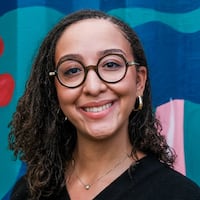The Atlanta Wealth Building Initiative, a nonprofit focused on building collective Black wealth, is changing its name and expanding its scope.
The move comes as organizations across the country focused on addressing diversity, equity and inclusion are facing shareholder backlash and lawsuits.
The Atlanta Wealth Building Initiative is changing its name to Kindred Futures, while expanding its work to the entire Deep South, well beyond Atlanta.
“This is a really tough time to lead in many, many fronts, but we have made a commitment ... where we will marry courage with impact,” Janelle Williams, CEO and cofounder of Kindred Futures, told The Atlanta Journal-Constitution.
Credit: Olivia Bowdoin
Credit: Olivia Bowdoin
Williams said the organization wants to stand on the right side of history, while also being careful with its language so as to not invite challenges that could prevent it from doing its work.
Other organizations have faced such challenges. Fearless Fund, the Atlanta-based venture capital firm started by Black women to invest in women of color, ended a small business grant contest for Black women to settle a yearlong racial discrimination lawsuit. Southwest Airlines, major law firms and the governors of Minnesota and Alabama have also been sued over race-conscious requirements in a variety of programs.
“We are very, very diligent about our framing and our language, but we fully believe, and the data continues to show us, that eliminating structural racism is a moral and economic imperative for this country,” Williams said.
Pushing back on Black exceptionalism
Williams is a longtime philanthropic leader who has worked at the Annie E. Casey Foundation and the Federal Reserve Bank of Atlanta. She co-founded AWBI in 2017 after hearing from local community members that there needed to be an organization to tackle the deep racial wealth divide in Atlanta.
Over the past seven years, the organization has released groundbreaking reports on the city’s income inequality, economic immobility and the state of Black businesses. It has put forward policy proposals and deployed grants to other organizations doing similar work.
Its research has found that Atlanta has the highest income inequality of any city in America, and a person born poor in Atlanta has only a 4% chance of getting out of poverty in their lifetime.
AWBI also found Black small businesses in Atlanta earn 17 cents for every $1 earned by all other small businesses.
As AWBI rebrands to Kindred Futures and expands its work to the rest of the Southeast, Williams says the organization is now trying to help create new economic models to address the issue that 2 million Black households in the region have zero or negative net worth. It is working toward shared prosperity.
The name Kindred Futures is an homage to Black and Southern culture, the idea of kinfolk, community and collective action.
“Our work actually intends to transcend Black exceptionalism,” Williams said, adding Kindred Futures is unveiling a new campaign called “The Talented 90th,” a reference to W.E.B. Du Bois’ influential 1903 essay, “The Talented Tenth,” that argued for a leadership class of exceptional African Americans to uplift the race.
Kindred Futures is taking a different approach, working to underscore “the power of collectivism and how we need to really think about more community wealth building models, shared ownership models,” Williams said.
The organization will work to create a network of other activists, researchers, media and others who are working to grow Black wealth across the Southeast.
Kindred Futures will help provide funding and organizational support like technical assistance and strategic advising to its network. It will also continue creating research and proposing policy, according to Williams.
“While there is this backlash on woke, DEI, racial equity work, I am very encouraged by the solidarity of leaders working in this space ... to continue to redefine what is possible,” Williams said.
The Atlanta Journal-Constitution and Report for America are partnering to add more journalists to cover topics important to our community. Please help us fund this important work here.
About the Author
Keep Reading
The Latest
Featured




